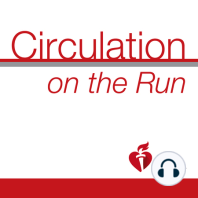18 min listen
Circulation August 28, 2018 Issue
ratings:
Length:
23 minutes
Released:
Aug 27, 2018
Format:
Podcast episode
Description
Dr Carolyn Lam: Welcome to Circulation on the Run, your weekly podcast summary and backstage pass to the Journal and its editors. I'm Dr Carolyn Lam, Associate Editor from the National Heart Center and Duke National University of Singapore. Do we finally now have a simple, evidence-based way to make a diagnosis of heart failure with preserved ejection fraction? Well, today's feature paper certainly brings us closer to that goal and you must listen to the discussion coming right up after these summaries. Bleeding is commonly cited as a reason for stopping oral anti-coagulants. However, what is the prognostic significance of minor bleeding events, or so called nuisance bleeding, in patients with atrial fibrillation on oral anti-coagulants? First and corresponding author, Dr O'Brien from Duke Clinical Research Institute and her colleagues, identified 6771 patients with atrial fibrillation in the Orbit AF Prospective Outpatient Registry. They ascertained nuisance bleeding from medical records defined as minor bleeding that did not require medical attention. Overall, 20% had documented nuisance bleeding giving an incidence rate of 14.8 events per hundred person years. Nuisance bleeding was not associated with a higher risk of major bleeding, or a stroke and systemic embolism over the next six months. These findings therefore suggest that the occurrence of nuisance bleeding or minor bleeding should not lead to changes in anti-coagulant treatment strategies in patients treated with anti-coagulants. The next study sheds new light on mechanisms linking NLRP3 inflammasome activation to atherogenesis. Dr Westerterp from Columbia University, New York and colleagues studied mice with myeloid deficiency of ATP binding cassette transporters A1 and G1 and concomitant deficiency of the inflammasome components NLRP3 or caspase-111. They showed that cholesterol accumulation in myeloid cells activated the NLRP3 inflammasome. NLRP3 inflammasome activation enhanced neutrophil accumulation and neutrophil extracellular trap formation in atherosclerotic plaques thus accelerating atherogenesis. Patients with Tangier's disease, who had ATP binding at transporter A1 loss of function, had increased myeloid cholesterol content and showed markers of inflammasome activation. Thus, inflammasome activation may underline cardiovascular disease in these patients. The next study identifies TPX20 as a novel transcription factor regulating angiogenesis. TPX20 is a crucial transcription factor for embryonic development and its deficiency is associated with congenital heart disease. However, its role in angiogenesis has been not been previously described. At least until today's paper from co-first authors Dr Meng and Dr Gu and co-corresponding authors Dr Cooke and Dr Fang from Houston Methodist Research Institute. These authors use loss and gain function approaches to explore the role of TPX20 in angiogenesis both in vitro and in vivo. They showed that with VEGF stimulation, the transcription factor TPX20 upregulated PROK2 with is secreted from endothelial cells and gauges its receptor PROKR1 and thereby promotes angiogenesis in autocrine manner. This novel signaling pathway appeared to be highly conserved as it functioned in zebra fish vascular development and the angiogenic response to ischemia in a mouse model of peripheral disease. The authors furthered showed the selective role of TPX20 in endothelial migration but not proliferation. Furthermore, treatment with recom
Released:
Aug 27, 2018
Format:
Podcast episode
Titles in the series (100)
Circulation January 23, 2018 Issue by Circulation on the Run
